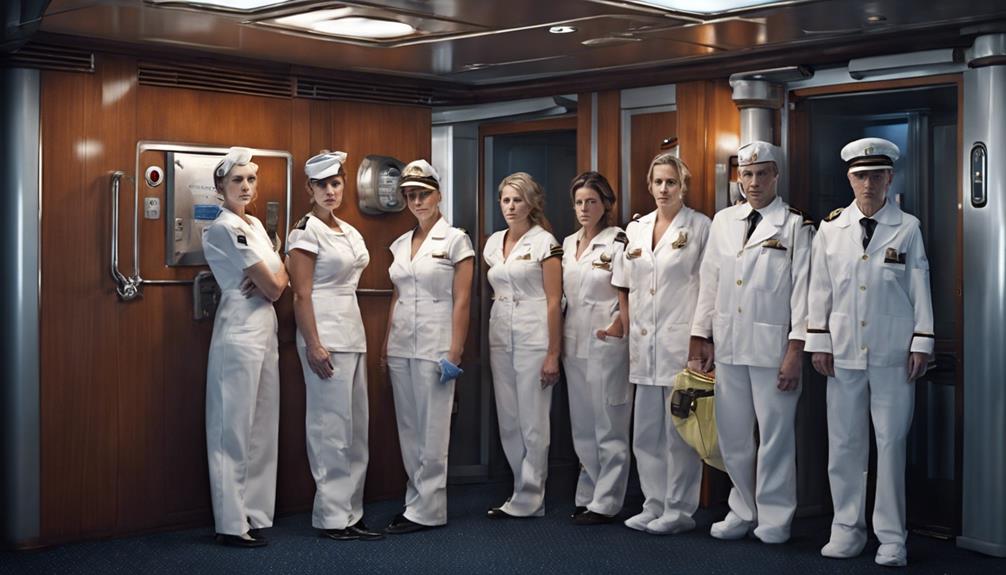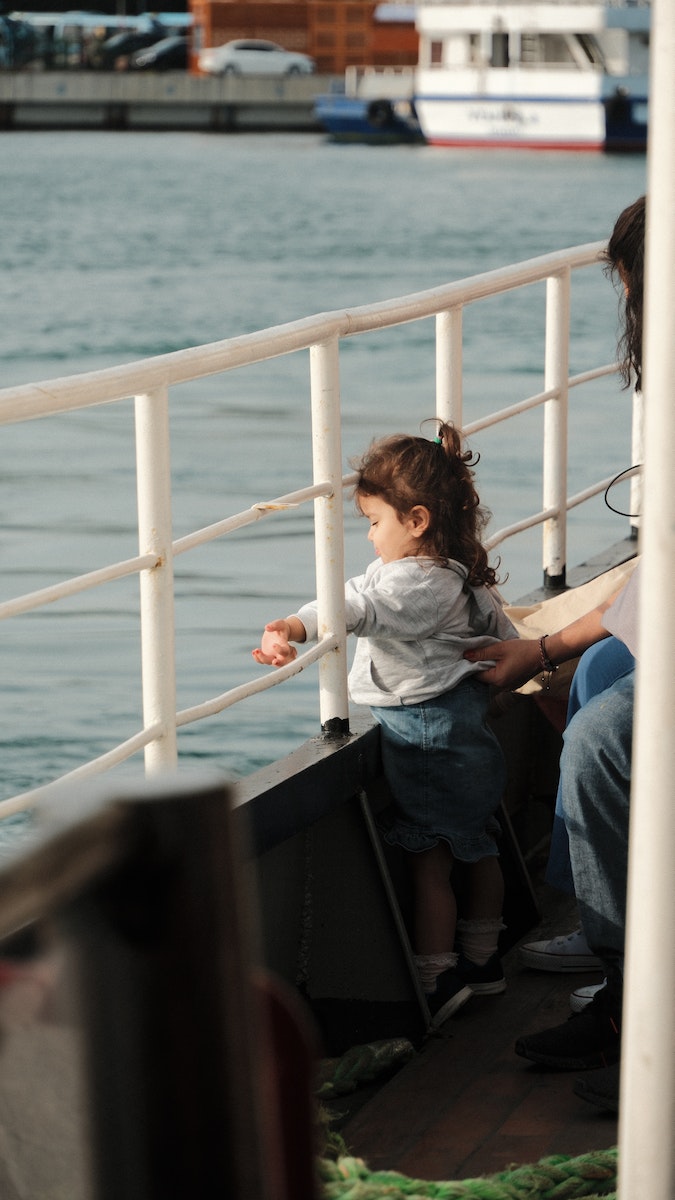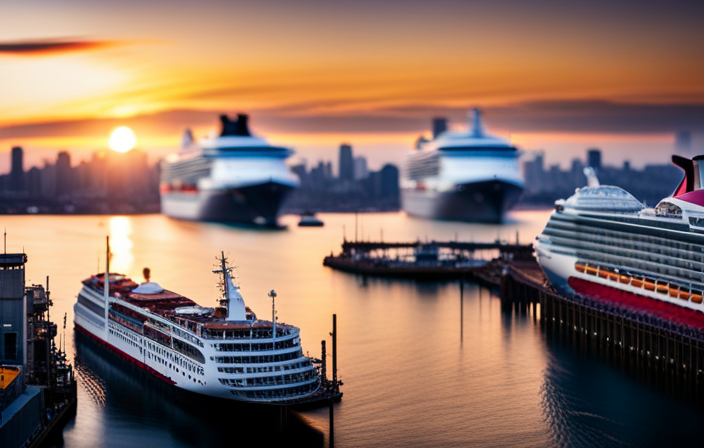Have you ever wondered about the protocols and procedures that are implemented when someone dies on a cruise ship?
The reality of these situations can be complex and sensitive, involving various steps that need to be followed meticulously. From notifying the authorities and securing the scene to the investigation by the cruise line and potential involvement of federal authorities, the process is intricate and requires a delicate approach.
Understanding these protocols is crucial, and in the following discussion, we will shed light on the important aspects of what transpires in such challenging circumstances.
Key Takeaways
- Immediate notification to authorities and family members.
- Professional handling and preservation of the scene.
- Coordination for repatriation logistics with consulate involvement.
- Cruise line investigations to determine cause of death and liability.
Notification of Authorities and Family
Upon the discovery of a passenger's death on a cruise ship, immediate notification to the relevant authorities is a crucial step in the established procedures and protocols. This notification serves to initiate the necessary legal and investigative processes.
Onboard medical personnel first examine the deceased passenger's body to determine the cause of death before promptly informing the relevant port authorities. Simultaneously, family members are informed by the cruise line or fellow passengers using emergency contact details. This swift notification ensures that families are promptly made aware of the situation, allowing them to begin making necessary arrangements and decisions.
Cruise lines have meticulously devised procedures to handle the notification process with sensitivity and efficiency, recognizing the importance of keeping families informed during such distressing circumstances. By promptly notifying both the authorities and the family, cruise lines demonstrate their commitment to upholding transparency and respect for all individuals involved in the unfortunate event of a passenger's death at sea.
Securing and Preserving the Scene
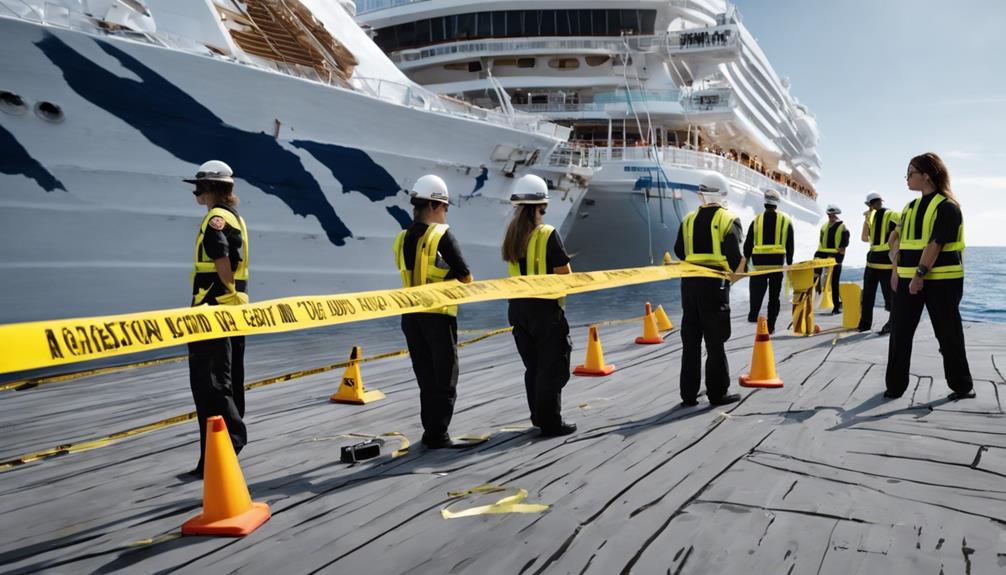
Implementing stringent security measures and meticulous documentation protocols are imperative for cruise ship staff when securing and preserving the scene of a passenger's death to ensure the integrity of the investigation process. Confidentiality, scene preservation, security measures, professional protocols, and investigations play crucial roles in this phase. The table below outlines key actions taken during the scene securing and preservation process:
| Actions | Description |
|---|---|
| Seal the cabin | Immediately seal the cabin to prevent unauthorized access and preserve the scene. |
| Restrict access | Limit access to only essential personnel and authorities to maintain integrity of the area. |
| Document the area and belongings | Thoroughly document the scene, personal belongings, and any potential evidence present. |
Adhering to professional protocols ensures that the scene is handled with care and sensitivity, maintaining the necessary chain of custody for any future investigations. Security measures are in place to prevent any tampering or disturbance of the area until the investigation procedures are completed.
Medical Examination and Documentation
Our team conducts a thorough medical examination and meticulously documents all findings following a passenger's death on a cruise ship.
The ship's medical staff, equipped to handle such situations, carefully examines the deceased individual to determine the cause of death. This medical examination is crucial as it helps in understanding the circumstances surrounding the passenger's demise.
The ship's medical personnel prepare detailed documentation, including any known cause of death, which is then recorded in the ship's official records. These records are essential for the cruise line's investigation into the incident.
The cause of death, if identified, is documented with precision and may be shared with relevant authorities as part of the investigative process.
The meticulous medical examination and documentation conducted by the ship's medical staff play a vital role in ensuring transparency and accuracy in handling a passenger's death on a cruise ship.
Transfer of the Deceased to Morgue
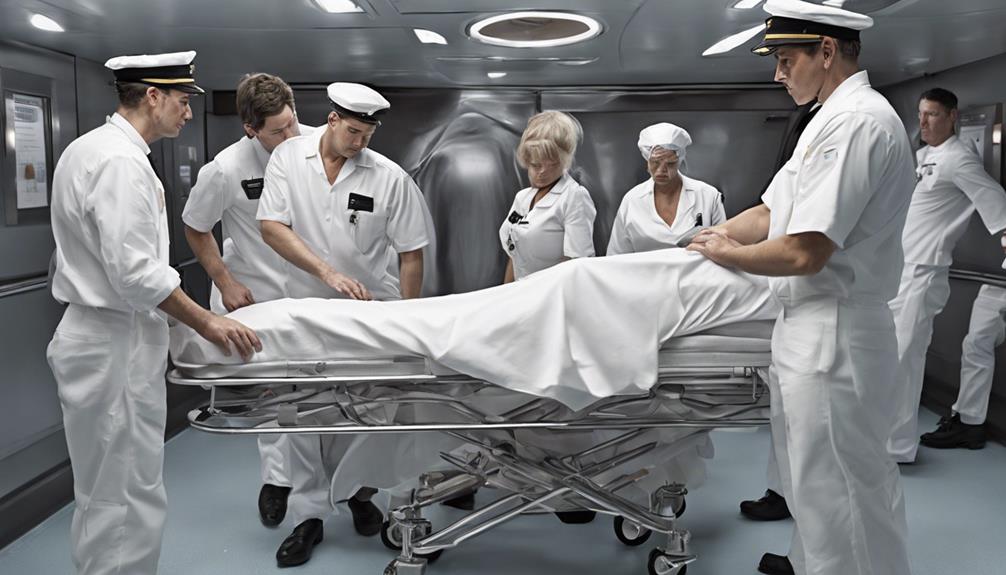
Upon the passing of a passenger, the ship's crew orchestrates the transfer to the onboard morgue, strategically situated on the lowest deck.
The morgue facilities, integral to the vessel's emergency response strategy, can accommodate 2-3 bodies on smaller ships and up to 10 on larger ones.
This process is executed with utmost care and respect, aligning with established protocols for handling the deceased on a cruise ship.
Morgue Logistics Onboard
When transferring deceased passengers to the morgue onboard a cruise ship, meticulous adherence to established protocols ensures efficient and discreet handling along the designated ship-wide corridor, known as the I-95. The morgue facilities are crucial for maintaining the dignity and respect of the deceased, as well as ensuring operational efficiency.
Here are key points regarding morgue logistics onboard:
- Cruise ships must have morgue facilities equipped with refrigeration for storing deceased passengers.
- The morgue's storage capacity varies, accommodating 2-3 bodies on smaller ships and up to 10 bodies on larger vessels.
- Deceased passengers are discreetly transferred to the morgue via the I-95 corridor, where they're stored until reaching the next port of call or the ship's origin.
Handling Family Arrangements
How does the cruise line handle the transfer of deceased passengers to the ship's morgue for temporary storage until the next port of call?
The cruise line ensures that the transfer of the deceased is done with sensitivity and respect for the family's emotional needs. Prompt notification is given to family members, who are then responsible for making arrangements for the repatriation of the deceased's remains upon reaching the next port.
Coordination between the cruise line and the family is vital for the smooth handling of the transfer to the morgue and subsequent repatriation process. During this challenging time, the cruise line aims to support the family in making necessary family arrangements while understanding the importance of handling the situation with the utmost care and consideration for their emotional well-being.
Communication With Next of Kin
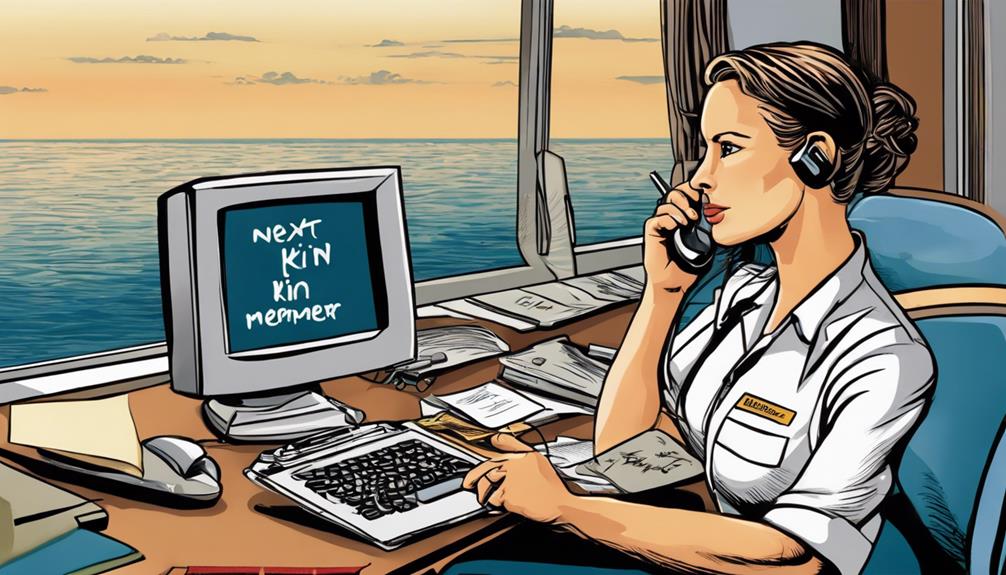
In the process of handling a death on a cruise ship, the communication with the next of kin is a crucial aspect that requires prompt and sensitive attention. Cruise lines follow specific procedures to ensure that family members are informed in a compassionate and timely manner:
- Emergency Contact Details: Cruise lines notify the next of kin of a deceased passenger using the emergency contact information provided during the booking process. This information is vital for reaching out to family members promptly.
- Onboard Assistance: Trained personnel or ministers may be available on the cruise ship to assist in notifying the family of the deceased. This support can help in delivering the news with the necessary care and consideration.
- Support from Fellow Passengers and Crew: Fellow passengers or crew members onboard may also play a role in informing the family members of the deceased back home. Their assistance can contribute to ensuring that the communication is handled with sensitivity and empathy.
Effective communication with the next of kin isn't only a procedural requirement but a fundamental aspect of addressing the emotional impact of a passenger's death while onboard.
Coordination for Repatriation
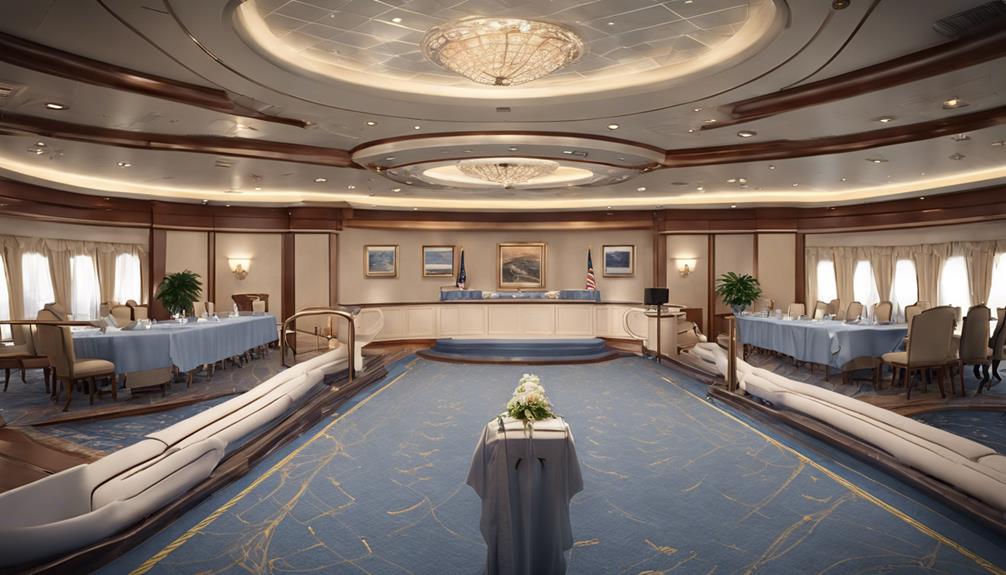
We'll address the coordination required for repatriation logistics, which involves intricate planning and communication with consulates.
The process includes liaising with specialized transport companies and funeral directors to ensure the deceased passenger's body is transported efficiently.
Consulate support is essential for navigating the necessary paperwork and language translation services to facilitate the repatriation process smoothly.
Repatriation Logistics Coordination
To ensure the efficient and compliant repatriation of deceased passengers, coordination efforts involve liaising with cruise staff, local authorities, and funeral providers at the initial harbor. The logistics of repatriation require meticulous planning and execution to meet legal requirements and respect the wishes of the deceased and their family.
Here are key points to consider in repatriation logistics coordination:
- Communication: Establish clear lines of communication between all parties involved to streamline the repatriation process.
- Logistical Support: Coordinate with specialized transport companies or funeral directors to manage the transportation of the deceased passenger's body.
- Compliance: Ensure strict adherence to international travel laws and regulations to facilitate the smooth repatriation of the deceased.
Consulate Communication Arrangements
Facilitating the repatriation process, consulates play a pivotal role in coordinating with local authorities to ensure compliance with international and local regulations concerning the transportation of deceased passengers' remains.
Consulates assist in arranging the necessary repatriation arrangements for the deceased passenger, including preparing and transporting their remains back to their home country. They work closely with local authorities to navigate the specific regulations of each country involved, ensuring all paperwork and communication with relevant parties are handled efficiently.
U.S. consulates, for example, provide valuable support in managing the legal aspects of repatriation, such as verifying the cause of death and adhering to international and local laws throughout the process. Consular offices serve as essential liaisons in the repatriation logistics, guaranteeing a smooth and lawful return of the deceased individual.
Legal Procedures and Documentation
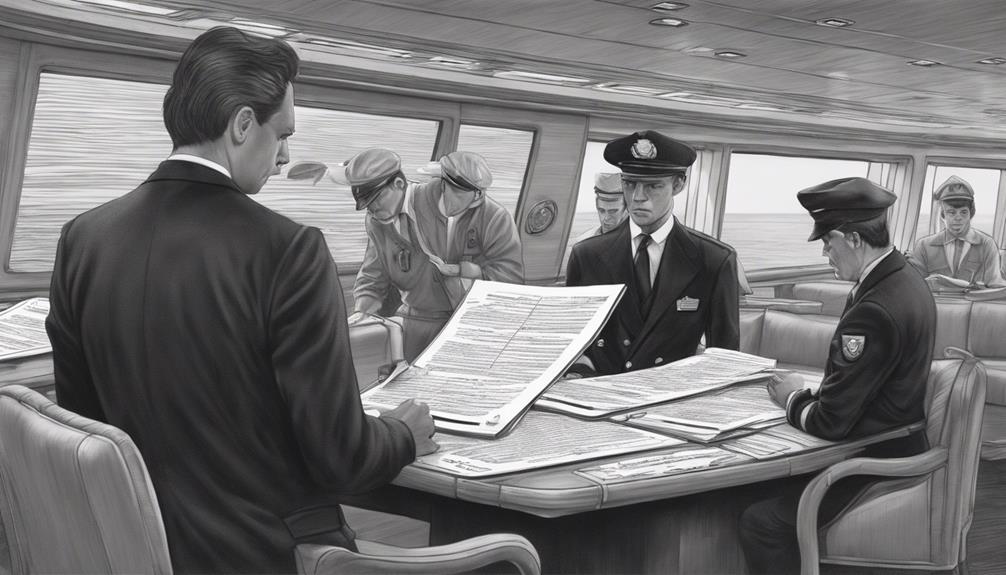
How can hiring a cruise ship accident lawyer assist in navigating the legal procedures and documentation following a death on a cruise ship? When a tragic incident occurs on a cruise ship, legal assistance becomes crucial in ensuring that the necessary steps are taken to protect the rights of the affected individuals. Here are three key ways in which a lawyer specializing in cruise ship accidents can be instrumental in handling the legal aspects after a death at sea:
- Expert Guidance: A cruise ship accident lawyer possesses the expertise to guide families through the complex legal procedures involved in obtaining the death certificate and other necessary documentation following a passenger's demise.
- Evidence Collection: These lawyers can help gather pertinent evidence, such as photos or videos from the deceased's cell phone, which could be vital in legal investigations related to the incident.
- Claim Filing: Timely filing of claims against the cruise line is crucial, and a legal professional can ensure that this process is completed within the legal deadline, safeguarding the rights of the deceased passenger's family.
Investigation by Cruise Line
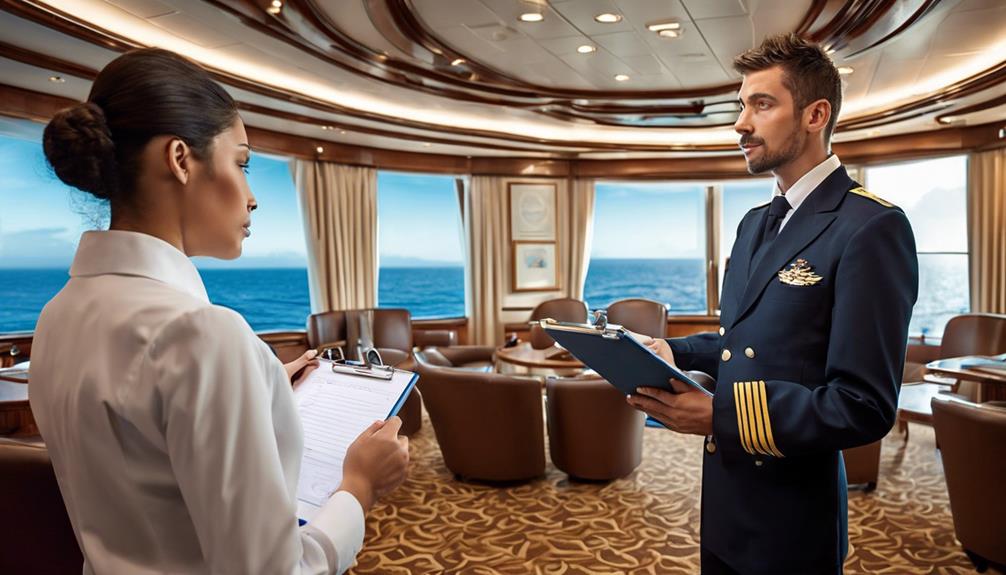
Our examination of the investigation by cruise lines into deaths onboard reveals critical aspects that demand scrutiny.
The onboard incident assessment, cooperation with authorities, and communication with the family represent pivotal points in understanding the cruise line's response to a passenger's death.
Through these lenses, we can evaluate the thoroughness, transparency, and alignment of the cruise line's internal investigation with external inquiries.
Onboard Incident Assessment
Upon the occurrence of an onboard incident, the cruise line promptly initiates an investigation to determine the cause of death, a process primarily aimed at safeguarding its own interests. This investigation delves into the medical care provided, potential liability concerns, and any suspicious circumstances surrounding the incident.
The cruise line's inquiry may differ from federal investigations, with initial findings not always aligning. The investigative process may be triggered by reports from passengers or family members flagging concerning details. It's crucial to note that the cruise line might withhold information that could indicate responsibility in the passenger's death.
These investigations are conducted autonomously, especially when suspicious circumstances are reported, setting them apart from federal inquiries.
Cooperation With Authorities
In conducting its investigation into a passenger's death, the cruise line focuses on protecting its interests and reputation. This process involves close cooperation with authorities, especially in cases where federal investigations are initiated due to suspicions of foul play.
While the cruise line's initial findings aim to protect its interests, federal authorities may uncover different information that could lead to further scrutiny. In instances where suspicious circumstances surround a passenger's death, such as potential criminal activities, the FBI may intervene to conduct separate investigations.
These investigations by authorities serve the purpose of determining liability and any necessary legal actions, which may impact the cruise line's handling of the situation and its potential outcomes.
Communication With Family
When investigating a passenger's death on a cruise ship, the cruise line prioritizes promptly notifying the family using designated emergency contact details.
Key Points:
- Specially trained individuals or ministers may assist in informing the deceased's family about the unfortunate incident.
- Crew members are available to support and provide assistance to family members during this challenging time.
- Fellow passengers may also play a role in informing the family members at home about the incident onboard.
Ensuring swift and compassionate communication with the family is crucial for cruise lines in providing the necessary support and assistance following a passenger's death. This process involves sensitivity and professionalism to handle the situation with care and respect for all involved parties.
Potential Involvement of Federal Authorities
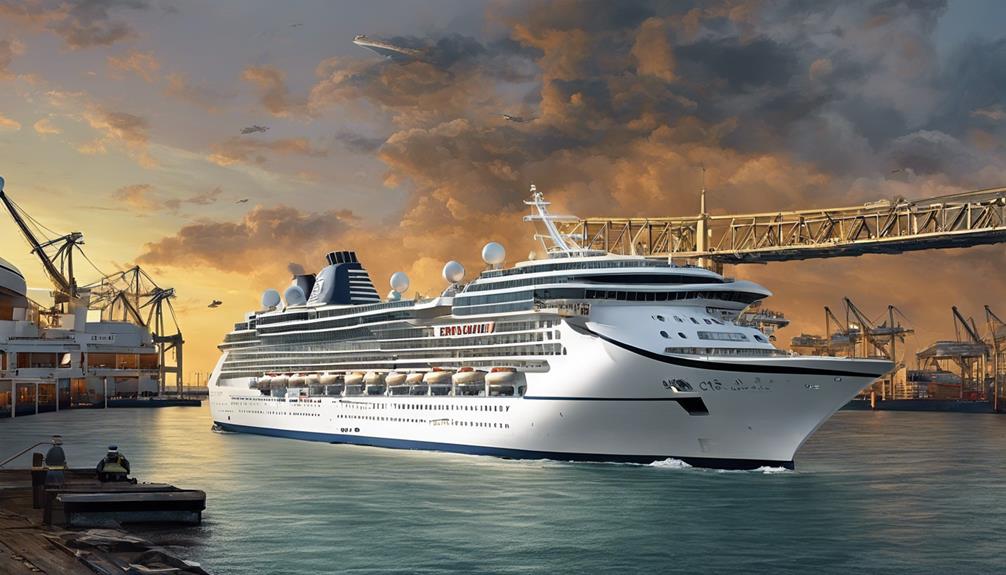
Federal authorities play a pivotal role in investigating suspicious deaths on cruise ships, particularly when concerns of foul play arise. The FBI, in particular, takes charge in cases of suspicious deaths on U.S. cruises, focusing on determining if foul play was involved. These investigations are conducted separately for criminal and civil purposes, ensuring a comprehensive inquiry into the circumstances surrounding the death.
Recent incidents have highlighted the FBI's involvement in cases where deaths raise suspicions, underscoring the importance of a thorough examination. If suspicious circumstances are reported regarding a death on a cruise ship, federal authorities may be called upon to initiate investigations. This could be triggered by reports from passengers or family members, prompting federal agencies to delve into the matter.
The presence of federal authorities in such situations adds a layer of expertise and resources to ensure that any potential foul play is thoroughly investigated.
Support Services for Passengers and Crew
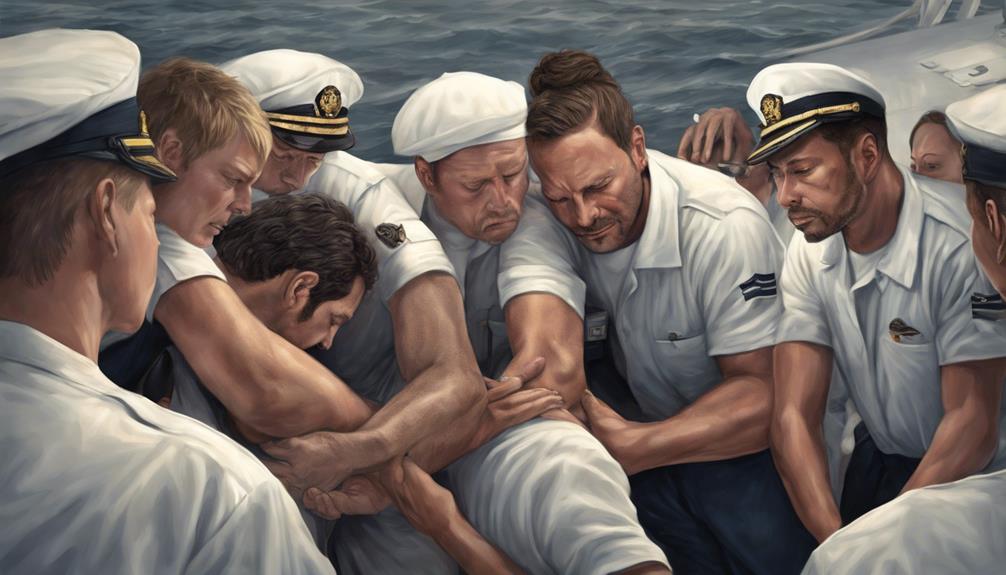
Following the investigation led by federal authorities into suspicious deaths on cruise ships, the focus shifts to the critical support services provided for passengers and crew members in such distressing circumstances.
Support Services for Passengers and Crew:
- Trained employees offer emotional and logistical support, including assistance with repatriating the deceased, contacting funeral homes, making travel arrangements, dealing with insurance, and coordinating with local authorities.
- Guest Care Team members provide additional services such as free Internet and phone use, transportation to hotels, and post-cruise follow-up support for those affected by an onboard death.
- Cruise lines have established procedures to manage passenger and crew deaths promptly, ensuring an organized response to such incidents. Support services extend to crew members, offering help with repatriation, funeral arrangements, and emotional support during challenging times. These services aim to provide comfort and assistance to individuals coping with the loss of a loved one while navigating complex logistical and emotional challenges.
Follow-Up and Aftercare Services
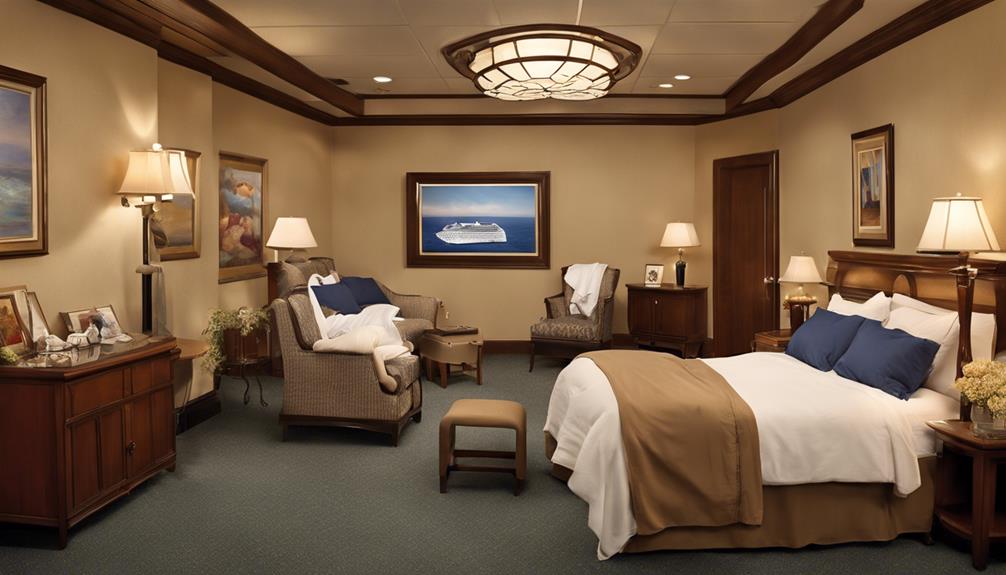
In the provision of follow-up and aftercare services following a death on a cruise ship, families are offered comprehensive support and assistance in handling the necessary arrangements. Cruise lines understand the emotional and logistical challenges that arise in such situations and aim to alleviate the burden on the passengers' families. The Guest Care Team members are trained to provide support in various aspects, including contacting funeral homes, making travel arrangements, and addressing insurance matters. This assistance extends to helping with repatriating the deceased passenger and coordinating with local authorities to ensure a smooth process.
To illustrate the range of services provided, the table below outlines the post-cruise follow-up and aftercare services offered to the passengers' families:
| Services | Description |
|---|---|
| Funeral Home Contacts | Assistance in connecting with local funeral homes for arrangements |
| Travel Arrangements | Support in organizing transportation for family members or the deceased passenger |
| Insurance Matters | Guidance on navigating any travel insurance policies or claims related to the incident |
| Emotional and Logistical Support | Comprehensive assistance in repatriating the deceased passenger, including emotional support |
Frequently Asked Questions
What Happens When People Die on Cruises?
When people die on cruises, the cruise ship's morgue temporarily holds the deceased. Families must manage repatriation. Investigations into the cause of death are conducted. If suspicions arise, federal authorities may intervene. Specific protocols are followed.
Do Cruise Ships Have a Morgue on Board?
Yes, cruise ships have a morgue onboard. The size varies; smaller ships store 2-3 bodies, while larger ones can accommodate up to 10. This ensures proper handling until disembarkation. The morgue is typically located on the lowest deck for accessibility.
What Is the Code for Death on a Cruise Ship?
When a death occurs on a cruise ship, the discreet code known as 'Operation Rising Star' is utilized. This code is part of emergency protocols, aiding in a sensitive and efficient response. It ensures prompt organization in such situations.
What Happens if You Need Emergency Surgery on a Cruise Ship?
In case of an emergency surgery on a cruise ship, our medical team swiftly assesses the situation. Stabilization and treatment occur onboard, ensuring safety. Evacuation is considered if needed. Protocols guide our actions, guaranteeing prompt and effective care.
Conclusion
In conclusion, the procedures and protocols in place for handling a passenger's death on a cruise ship are meticulously executed to ensure the utmost care and respect for the deceased and their loved ones.
Through a thorough investigation process and coordination with relevant authorities, the cruise line strives to provide support and assistance to all parties involved.
It's a complex and delicate process, but necessary in upholding the standards of safety and accountability in the maritime industry.

